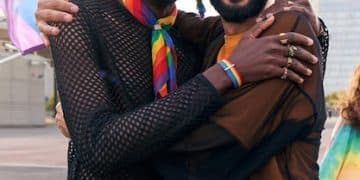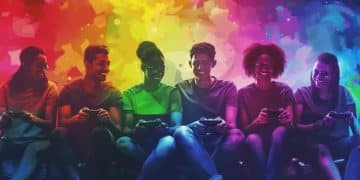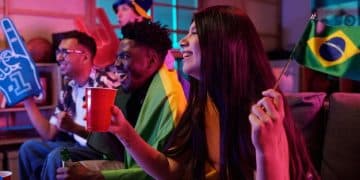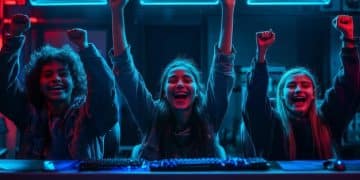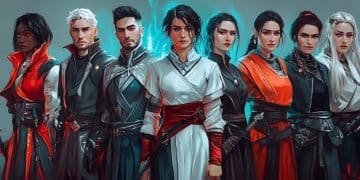Debunking LGBTQ+ Gamer Myths in League of Legends
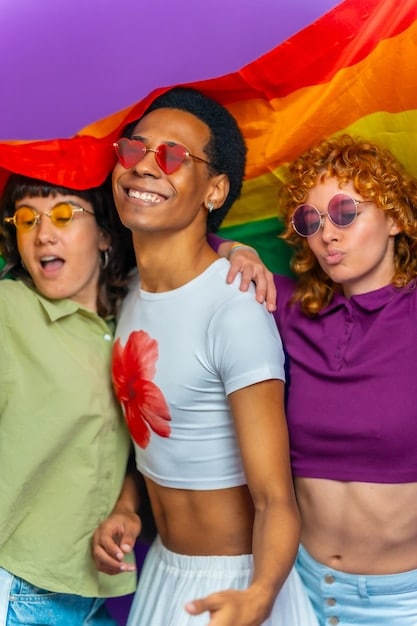
Debunking myths and stereotypes about LGBTQ+ gamers in the League of Legends community is crucial for fostering inclusivity and dispelling misinformation, leading to a more welcoming and representative gaming environment.
The League of Legends community, like many online spaces, can be a breeding ground for misconceptions. When it comes to LGBTQ+ gamers, these misconceptions often take the form of harmful myths and stereotypes. This article aims at debunking myths and stereotypes about LGBTQ+ gamers in the League of Legends community and fostering a more inclusive and understanding gaming environment.
Understanding LGBTQ+ Identity in the Gaming Community
Before addressing specific myths, it’s vital to understand the broad spectrum of LGBTQ+ identities within the gaming community. LGBTQ+ encompasses lesbian, gay, bisexual, transgender, queer, and many other identities, each with its own unique experiences and perspectives. Recognizing this diversity is the first step toward dispelling harmful stereotypes.
Within the League of Legends community, LGBTQ+ gamers are a vibrant and active part of the player base. They participate in all aspects of the game, from casual play to competitive tournaments, and contribute to the community through streaming, content creation, and community leadership.
The Importance of Representation
Representation matters. Seeing LGBTQ+ characters and storylines in games like League of Legends helps normalize LGBTQ+ identities and promotes acceptance. When LGBTQ+ gamers see themselves reflected in the games they play, it can create a sense of belonging and validation.
- Increased visibility can help dismantle stereotypes and misconceptions.
- Positive representation can create a more inclusive and welcoming community.
- Lack of representation can lead to feelings of isolation and marginalization.
However, representation is not enough. It’s crucial to ensure that representation is authentic and respectful, avoiding harmful tropes and stereotypes. Only then can representation truly contribute to a more inclusive gaming environment.
In conclusion, recognizing the diversity of LGBTQ+ identities and the importance of representation is essential for addressing the myths and stereotypes that exist within the League of Legends community.
Myth 1: LGBTQ+ Gamers are a Small Minority
One common myth is that LGBTQ+ gamers are a small or insignificant minority within the gaming community. However, studies and surveys consistently show that LGBTQ+ individuals are a significant portion of the gaming population.
Data from various research firms indicates that LGBTQ+ individuals are just as likely, if not more likely, to identify as gamers compared to their heterosexual and cisgender counterparts. This is in part due to the sense of community and escapism that gaming can offer.
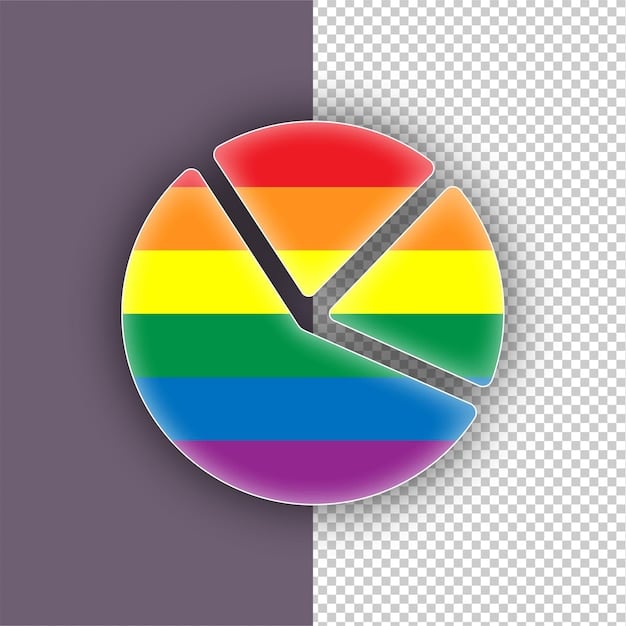
Challenging the Perception of Scarcity
The myth of LGBTQ+ gamers being a small minority can lead to a perception of scarcity, where their voices and concerns are marginalized. By understanding that LGBTQ+ gamers are a significant part of the community, we can start to challenge this perception and create a more equitable gaming environment.
- Recognizing the prevalence of LGBTQ+ gamers can amplify their voices.
- Greater awareness can lead to more inclusive game design and community practices.
- Challenging the perception of scarcity can create a more welcoming space for LGBTQ+ gamers.
This myth is often perpetuated by a lack of visibility and representation. When LGBTQ+ gamers are not openly visible within the community, it can create the illusion that they are a small minority. By promoting visibility and creating spaces where LGBTQ+ gamers feel safe to be themselves, we can dispel this myth.
To summarize, the idea that LGBTQ+ gamers are a small minority is demonstrably false. Recognizing their significant presence is the first step in creating a more inclusive and representative gaming community.
Myth 2: LGBTQ+ Identity is a Distraction in Competitive Gaming
Another harmful myth is that discussing or acknowledging LGBTQ+ identity is a distraction or irrelevant in competitive gaming. This myth often manifests as the idea that “gaming should be about skill, not identity.”
However, identity is an integral part of who we are, and it inevitably shapes our experiences, including our experiences in gaming. For LGBTQ+ gamers, their identity can influence how they interact with the game, how they form connections with other players, and how they navigate the gaming community.
The Intersection of Identity and Skill
Suggesting that identity is a distraction in competitive gaming ignores the fact that LGBTQ+ gamers bring their unique perspectives and experiences to the game, which can enrich the competitive landscape. Moreover, creating a welcoming and inclusive environment can actually enhance performance by allowing all players to feel comfortable and supported.
- Acknowledging identity fosters a more inclusive community.
- Diversity of perspective enhances competitive gaming strategies.
- Supportive environments boost overall player performance and morale.
Moreover, silencing discussions about LGBTQ+ identity can create a hostile environment for LGBTQ+ gamers. When they are forced to hide or downplay their identity, it can lead to feelings of isolation, anxiety, and even discrimination. This can ultimately impact their ability to perform at their best.
In conclusion, the myth that LGBTQ+ identity is a distraction in competitive gaming is not only false but also harmful. Acknowledging and celebrating diversity can create a more inclusive and ultimately more competitive environment.
Myth 3: All LGBTQ+ Gamers Want Special Treatment
A recurring stereotype suggests that LGBTQ+ gamers are seeking “special treatment” or advantages within the gaming community. This often surfaces when discussions about inclusivity or representation arise.
In reality, LGBTQ+ gamers are primarily advocating for equal treatment and a level playing field. They seek recognition, respect, and the same opportunities as their heterosexual and cisgender counterparts. The goal is not to gain preferential treatment but to dismantle systemic barriers that prevent them from fully participating in the gaming community.
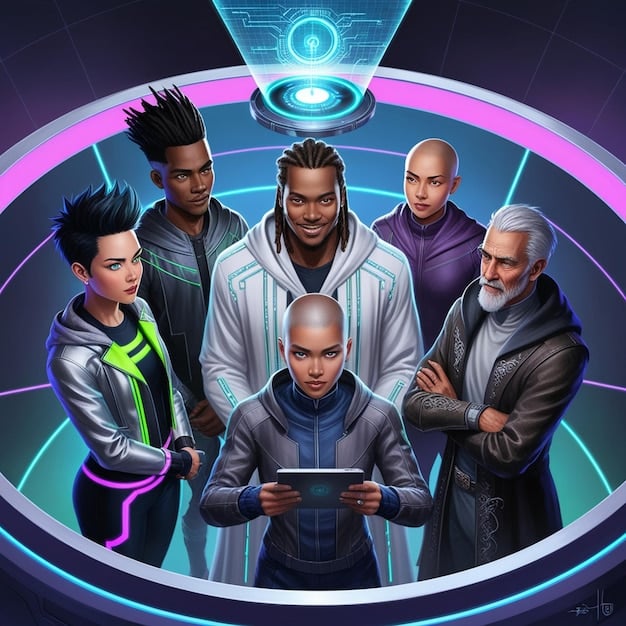
Understanding the Call for Equity
The push for inclusive spaces and representation standards is not about elevating LGBTQ+ gamers above others. It’s about correcting historical imbalances and creating an environment where everyone, regardless of their identity, feels safe, valued, and respected. This involves addressing discrimination, promoting visibility, and ensuring that LGBTQ+ voices are heard and valued.
- Equal opportunities, not special favors, are the objective.
- The focus is on dismantling systemic barriers to participation.
- Creating a welcoming environment benefits the entire community.
This myth often stems from a misunderstanding of equity vs. equality. Equality means treating everyone the same, while equity means giving everyone access to the same opportunities, which may require different approaches to address existing inequalities.
In summary, LGBTQ+ gamers are not seeking special treatment. Their primary concern is the creation of a fair, inclusive, and supportive gaming environment where everyone can thrive.
Myth 4: League of Legends is Already Inclusive Enough
Some may argue that League of Legends is already inclusive enough and that there’s no need for further efforts to support LGBTQ+ gamers. This sentiment often stems from a lack of awareness about the challenges that LGBTQ+ gamers continue to face.
While League of Legends has made strides in promoting diversity and inclusion, there is still work to be done. LGBTQ+ gamers continue to experience discrimination, harassment, and a lack of representation in the game and the broader community. Furthermore, even if the game itself is inclusive, the community around it may not be, creating a hostile environment for LGBTQ+ gamers.
The Ongoing Need for Inclusivity Initiatives
It’s important to recognize that inclusivity is an ongoing process, not a destination. Even in seemingly inclusive environments, there may be hidden biases or microaggressions that can negatively impact LGBTQ+ gamers. Continuous efforts are needed to promote awareness, challenge stereotypes, and create a truly welcoming community.
- Acknowledging that inclusivity is an ongoing process is vital.
- Addressing discrimination, harassment, and underrepresentation is crucial.
- Community norms and behaviors must be actively cultivated to ensure inclusivity.
Furthermore, it’s important to listen to the experiences of LGBTQ+ gamers themselves. They are the experts on their own experiences and can provide valuable insights into the challenges they face and the solutions that are needed.
Ultimately, while progress has been made, it’s crucial to acknowledge that League of Legends is not yet fully inclusive. Continuing to push for inclusivity will create a better gaming experience for everyone.
Myth 5: Discussions About LGBTQ+ Issues are “Too Political” for a Game
A frequently voiced concern is that dedicating attention to LGBTQ+ issues in gaming is “too political” or inappropriate for a recreational activity. However, this perspective overlooks the fundamental reality that individual identities are inherently intertwined with broader social and political contexts.
For LGBTQ+ individuals, their identities are not merely personal preferences; they are often the focal points of political debates, legal battles, and social movements. Dismissing discussions about LGBTQ+ issues as “too political” effectively silences the voices of LGBTQ+ gamers and marginalizes their lived experiences.
The Intertwined Nature of Identity and Politics
Creating inclusive spaces and promoting LGBTQ+ representation in games are not inherently political acts. They are acts of empathy and support that contribute to a more welcoming and equitable environment for all players. By creating a space where LGBTQ+ gamers feel safe and seen, we can foster a stronger and more vibrant community.
- Providing a welcoming environment shouldn’t be seen as a political act.
- Acknowledging that everyone’s identities are intertwined with broader social and political contexts is crucial.
- Listening to the experiences of LGBTQ+ gamers is vital for ensuring equal treatment.
Furthermore, games have always been a platform for exploring social and political themes. From addressing issues of war and conflict to exploring themes of morality and ethics, games have the power to provoke thought and inspire change.
In conclusion, discussions about LGBTQ+ issues are not “too political” for gaming. They are essential for creating a more inclusive, equitable, and vibrant community for all players.
| Key Point | Brief Description |
|---|---|
| 🌈 LGBTQ+ Presence | LGBTQ+ gamers are a significant portion of the LoL community. |
| 🎮 Identity & Skill | LGBTQ+ identity is not a distraction, it enhances the gameplay. |
| 🤝 Equal Treatment | LGBTQ+ gamers want equal opportunity, not special treatment. |
| 🏳️🌈 Inclusivity | LoL must continuously work to be more inclusive and welcoming. |
FAQ
▼
Yes, studies indicate a substantial portion of gamers identify as LGBTQ+, making them a visible and impactful presence in the League of Legends community and beyond.
▼
Open discussion can foster inclusivity and support, potentially enhancing performance by creating a more comfortable and accepting environment for all players.
▼
No, they primarily seek equal treatment and the same opportunities as others, advocating for a fair and inclusive gaming environment for everyone.
▼
While progress has been made, ongoing efforts are necessary to address remaining instances of discrimination and underrepresentation within the game and its community.
▼
Gaming should be a safe space for everyone. Discussing LGBTQ+ issues creates an accepting and equitable environment where all players are respected for who they are.
Conclusion
By debunking myths and stereotypes about LGBTQ+ gamers in the League of Legends community we can foster a more inclusive and welcoming gaming environment. Creating spaces where LGBTQ+ gamers feel safe, respected, and valued is essential for building a stronger and more vibrant community for everyone.
